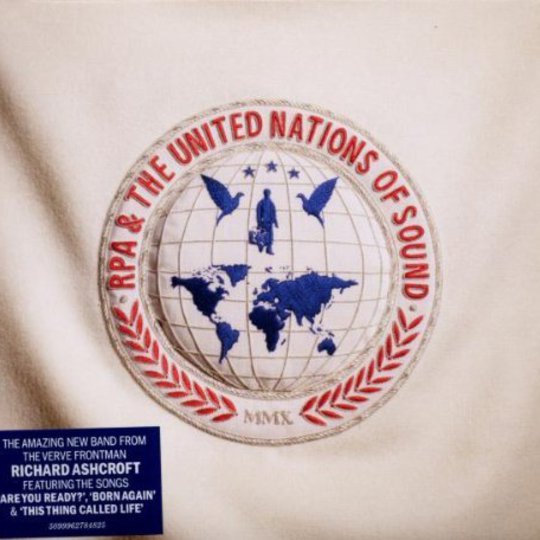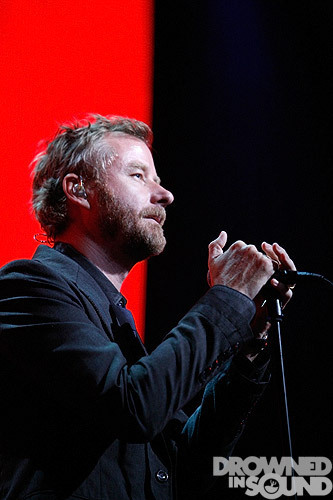Richard Ashcroft is, in many ways, as hysterically predictable as his detractors suggest he is, like one of those old people who still eats brawn because it reminds them of the Blitz. There is absolutely no indication from recent interviews that he has developed an iota of irony, that he has any sense of humour whatsoever, or that he has even laughed, or smiled, at any point in the last decade. His new outfit, RPA and the United Nations of Sound is clearly just him and a bunch of guns for hire – something highlighted by the press release's referring to his guitarist as ‘Mary J Blige’s guitarist’. And that ‘P’, with crushing inevitability, stands for Paul; if it was anything even slightly more outré, you suspect he’d have kept it under wraps.
And yet this ornery obstinacy has, in United Nations of Sound, birthed one of the more surprising records of Ashcroft’s career. Most musical reinventions by older artists are appallingly self-conscious; Richard Ashcroft is a man who once expressed the belief that he could probably fly, and has never given the slightest indication he knows what self consciousness means. Thus while United Nations of Sound sees him unexpectedly entrenched in R&B/hip hop textures, he clearly hasn’t done this for voguish effect. The record is produced by Chicago hip-hop godfather No ID, and you suspect this is nothing to do with Ashcroft deciding he needed to freshen his sound, and everything to do with him waking up one morning, thumbing through his record collection, and deciding that he, Richard Ashcroft, would make an album with No ID. Ditto string arranger Benjamin Wright, who did the honours for Michael Jackson’s Off the Wall, and engineer Reggie Dozier, a Motown veteran.
The results are, errrrr... mixed. At the one end of the spectrum are the slow jams, most of which, musically speaking, have a kind of late Nineties/mid Noughties rap ballad vibe to them (think Puff Daddy, think dead Tupac). ‘This Thing Called Life’ and ‘Good Lovin’ both start with the type of pseudo-Marvin Gaye squelch and big, processed bump’n’grind beats that are just itching for somebody to go “uh huh, oh yeah, we gonna talk ‘bout somethin’ serious today” over them; that Ashcroft doesn’t do this is probably testament to the fact that he’s always talking about somethin’ serious. I think I’ll just leave it and say that this is not a man whose voice or persona is very suited to make out music, something I fear Kate Radley has learned to her cost. What I would say is that I quite like ‘Life Can Be So Sweet’, in which Ashcroft breaks out a falsetto, his vocals multi-tracked to have himself grunting suggestively in the background. It’s kind of hypnotically weird, and there’s something endearing about the way he’s obviously having a bit of trouble holding onto the high notes, while the brass and string backing has a sunny effortlessness not really shared by the rest of the album. If you absolutely had to have sex to music written by this man, I would direct you to this song and then quietly go and part with my lunch.
The meat of the record, however, lies with the big, strident, crunchy numbers that aren’t a huge departure from The Verve’s decent ‘Love is Noise’, albeit on a more overblown scale. ‘Are You Ready’, ‘Born Again’, ‘America’, ‘Beatitudes’... we’re talking epic string loops, tough, nuggety beats, Hendrix-ish guitar, phased, sampled backing vocals... it’s ludicrously bombastic, but frequently on the catchy side, even if it’s not especially apparent whether Ashcroft or No ID is the more responsible (though the former does take sole writing credit). Later on and ‘How Deep Is Your Man’ is a bottleneck blues stomp that doesn’t really transcend homage, but y’know... it’s different. Best, though, is ‘Royal Highness’ which sounds exactly like Cher’s ‘If I Could Turn Back Time’, with maybe a splash of MGMT’s ‘Time To Pretend’ in the vocal line. If it didn’t have a total ‘meh’ of a chorus then it would be amazing... as it is, it’s fun.
And I think, discounting the ballads, the record as a whole would be something of an OTT hoot were it not for the dominating vocal presence of Ashcroft himself. “Muslim, Sikh, Buddhist too, I feel so damn free I don’t need all of you” he hollers, hoarsely, on ‘Are You Ready’. “I ain’t a Christian, I ain’t gay or straight, I am just living life in my own peculiar way”. Okay, crap lyrics are one thing, but some gravel-voiced berk turned way up in the mix incessantly growling the type of revelation most of us received upon the partaking of our inaugural spliff... basically, if you understand English, it seems inconceivable that you could sit through the whole thing without at least fleetingly praying that you didn’t. “Ah yeah, the whole damn human race, I wanna put you in my arms, And give you a love embrace”. No Richard, please, please don’t touch me. It’s ‘Born Again’, though, that absolutely takes the biscuit: in the end phases he goes full on Sunday devotional on us, imploring us to “Come on!” before starting a chant of “one life, one life, oh! Yeah! Oh yeah! One nation! One nation!”. A choir takes up the chant, but, nightmarishly enough, it actually appears to just be layers and layers of his own vocals. It’s just plain WRONG.
Ultimately, despite some innovation, United Nations of Sound cannot transcend the presence of its architect, who renders half the tracks fundamentally unlistenable with his horrible attempts to play gospel preacher or loverman. Yet, that all said, this guy is pushing 40, he’s clearly making exactly the music he wants to be making, and for a man who often get offhandedly dismissed as a purveyor of pure AOR, this is at the very least ‘different’. Or to put it another way: he’s Richard Paul Ashcroft and he can do whatever the fuck he wants, thankyouverymuch.
-
4Andrzej Lukowski's Score






















